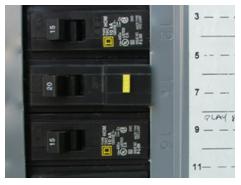|
|
 |
|
What is a GFCI Receptacle?
|
 |
|
A Ground Fault Circuit Interrupter receptacle is a special outlet that
is used in wet and damp locations such as kitchen and bathroom countertops, basements, garages, and outside. In addition to
working like a regular receptacle, it is designed to protect you from shocks that could be fatal. GFCI receptacles became required in new construction since 1973. Technically, older homes are exempt
from this requirement but from a safety standpoint, it would be foolish to not install them. The cost of these receptacles
is minor when compared against the degree of safety they provide.
|
 |
|
All GFCI receptacles
have two buttons on their face marked TEST and RESET. A good practice would be to test these devices about once a month or
so to make sure they’re still working properly. Simply press the TEST button. This will cause the RESET button to trip
and power to the outlet should be turned off. Power is restored when the RESET button is pressed back in. The receptacle should be replaced if any of the following occurs after pressing
the TEST button: the RESET button does not pop out; power to the outlet is not cut off; pressing the RESET button does not
restore power to the outlet. These are all signs that the outlet is no longer providing shock protection and it could be hazardous
to continue using it.
|
 |
|
Some people may ask,
“why do I have to test these receptacles so often?” The reason is that some older GFCI receptacles can go bad,
but still provide power to the outlet. These outlets, while providing power, are NOT providing shock protection. Without regular
testing by you, there is no way to find out these outlets aren’t providing shock protection until it’s too late.
|
 |
|
Additionally, GFCI receptacles have the ability to protect other outlets on the
same circuit. These are considered as being installed ‘downstream’ of the GFCI receptacle. An easy way to tell
if a standard outlet (for instance, on a kitchen countertop) is protected by a GFCI receptacle is to press the TEST button.
The GFCI and any downstream regular outlets should stop working until you press in the RESET button.
 Lastly, some houses
may have a GFCI circuit breaker in the electric panel instead of a GFCI receptacle. In this scenario, regular outlets are
used, since the shock protection comes from the GFCI circuit breaker. This breaker has a test button on its face that
when pressed, will cause the circuit breaker to trip (the middle breaker in the picture to the right is a GFCI breaker - notice
the yellow TEST button). Power is quickly restored by resetting the circuit breaker. When testing a GFCI breaker, you should
check to make sure the outlets are not ‘live’ after the breaker is tripped. While this protection is equal to
the protection provided by the GFCI receptacle, most people prefer the receptacle type, since it’s easier to reset it
after a fault, since you don’t have to walk all the way to the electric panel location.
|
|
|
Licensed electricians serving Orange
county, Sullivan county, and Ulster county in New York (845) 888-8000
_________________________________________________________________________________________________ All information contained within this site ©2004-2016, Wurtsboro Electric Service, Inc. All rights
reserved.
Reproducing or duplicating any information contained herein is prohibited by law.
|
|
|
 |

